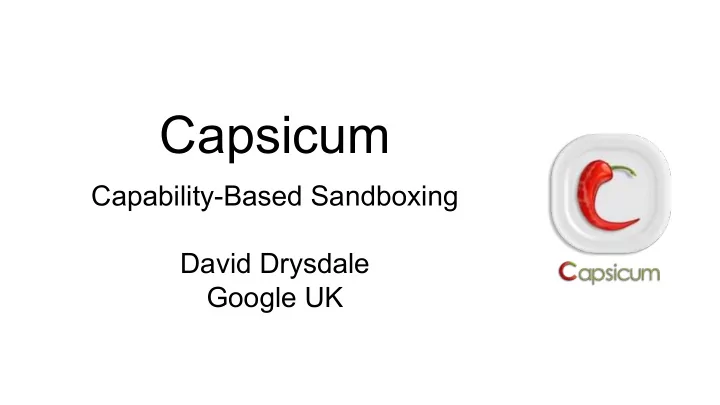

Capsicum Capability-Based Sandboxing David Drysdale Google UK
Features Current LXC uses the following kernel features to contain processes: ● Kernel namespaces (ipc, uts, mount, pid, network and user) ● Apparmor and SELinux profiles ● Seccomp policies ● Chroots (using pivot_root) ● Kernel capabilities ● CGroups (control groups)
Agenda ● Ideas ○ Privilege Separation ○ Capabilities ● Capsicum ○ Hybrid with POSIX ○ Application changes ● Linux container features ● Status/Outlook
Check Your Privileges ● Drop unnecessary privileges ○ Just because a process starts as root , doesn't have to stay that way
Check Your Privileges ● Drop unnecessary privileges ○ Just because a process starts as root , doesn't have to stay that way ● Divide up software according to what privileges are needed ○ E.g. separate media processing from credentials processing
Check Your Privileges ● Drop unnecessary privileges ○ Just because a process starts as root , doesn't have to stay that way ● Divide up software according to what privileges are needed ○ E.g. separate media processing from credentials processing ● Examples: ○ OpenSSH: credential checking process ○ Chrome: renderer processes ● Design impact: ○ Do privileged operations first ○ Pass resources down a privilege gradient
Capability-Based Security ● Make the privileges that a process holds more explicit
Capability-Based Security ● Make the privileges that a process holds more explicit ● Access objects via unforgeable token: the capability ○ Identifies the object ○ Accompanying rights give allowed operations ○ Can only reduce, not increase rights ○ Can pass capabilities around
Capability-Based Security ● Make the privileges that a process holds more explicit ● Access objects via unforgeable token: the capability ○ Identifies the object ○ Accompanying rights give allowed operations ○ Can only reduce, not increase rights ○ Can pass capabilities around ● Remove other ways of accessing objects ○ No access by name, i.e. no global namespaces
Analogy: File Descriptors ● Refers to kernel object (open file, open socket, ...) ● Can only be created by the kernel ● Can be passed between processes (over UNIX domain sockets)
Analogy: File Descriptors ● Refers to kernel object (open file, open socket, ...) ● Can only be created by the kernel ● Can be passed between processes (over UNIX domain sockets) ● ... but no real model of rights ○ O_RDONLY / O_RDWR not good enough
Capsicum: Make the analogy reality ● File descriptors as Capsicum capabilities
Capsicum: Make the analogy reality ● File descriptors as Capsicum capabilities ● Add fine-grained rights, policed by kernel ○ CAP_READ, CAP_WRITE, CAP_LOOKUP, CAP_FCHMOD, ... ○ CAP_BIND, CAP_ACCEPT, CAP_CONNECT, CAP_SETSOCKOPT, ...
Capsicum: Make the analogy reality ● File descriptors as Capsicum capabilities ● Add fine-grained rights, policed by kernel ○ CAP_READ, CAP_WRITE, CAP_LOOKUP, CAP_FCHMOD, ... ○ CAP_BIND, CAP_ACCEPT, CAP_CONNECT, CAP_SETSOCKOPT, ... ● Capability mode ○ Remove access to global namespaces ○ Turn off most ways of minting new (unrestricted) file descriptors ■ openat(dfd, "path"...) allowed ■ accept(socket ...) allowed
Example: strings
Example: strings + cap_rights_t rights; + cap_rights_limit(fileno(stdout), cap_rights_init(&rights, CAP_WRITE, CAP_FSTAT)); + cap_rights_limit(fileno(stderr), cap_rights_init(&rights, CAP_WRITE)); for (ii = 0; ii < num_streams; ++ii) { ...
Example: strings + cap_rights_t rights; + cap_rights_limit(fileno(stdout), cap_rights_init(&rights, CAP_WRITE, CAP_FSTAT)); + cap_rights_limit(fileno(stderr), cap_rights_init(&rights, CAP_WRITE)); + cap_rights_init(&rights, CAP_READ, CAP_SEEK, CAP_FSTAT, CAP_FCNTL); + for (ii = 0; ii < num_streams; ++ii) { + if (streaminfo[ii].stream) + cap_rights_limit(fileno(streaminfo[ii].stream), &rights); + } for (ii = 0; ii < num_streams; ++ii) { ...
Example: strings + cap_rights_t rights; + cap_rights_limit(fileno(stdout), cap_rights_init(&rights, CAP_WRITE, CAP_FSTAT)); + cap_rights_limit(fileno(stderr), cap_rights_init(&rights, CAP_WRITE)); + cap_rights_init(&rights, CAP_READ, CAP_SEEK, CAP_FSTAT, CAP_FCNTL); + for (ii = 0; ii < num_streams; ++ii) { + if (streaminfo[ii].stream) + cap_rights_limit(fileno(streaminfo[ii].stream), &rights); + } + cap_enter(); + for (ii = 0; ii < num_streams; ++ii) { ...
Features Current LXC uses the following kernel features to contain processes: ● Kernel namespaces (ipc, uts, mount, pid, network and user) ● Apparmor and SELinux profiles ● Seccomp policies ● Chroots (using pivot_root) ● Kernel capabilities ● CGroups (control groups)
fine grained broad chroot brush simple complex
fine grained kernel capabilities broad chroot brush simple complex
fine grained seccomp cgroups kernel capabilities broad chroot brush simple complex
fine grained seccomp SELinux cgroups kernel capabilities broad chroot brush simple complex
fine grained namespaces seccomp SELinux cgroups kernel capabilities broad chroot brush simple complex
fine Capsicum grained namespaces seccomp SELinux cgroups kernel capabilities broad chroot brush simple complex
Themes ● Involves code changes ● Less flexible in some ways ○ But simple to understand & apply ○ Not specific to root ● More fine-grained in other ways ○ FD-by-FD, not application-wide ● Easy to analyze ● Composes with other features
Status ● OS Support ○ In FreeBSD >= 10.x ○ Out-of-tree patch set for Linux (github.com/google/capsicum-linux) ● Application Support ○ ~20 in-tree FreeBSD applications ○ OpenSSH / tcpdump / xz ○ (Chromium) ● Next ○ More applications (join us!) ○ More debugging facilities
References ● Home page: http://www.cl.cam.ac.uk/research/security/capsicum/ ● Linux home page: http://capsicum-linux.org/ ● Intro article: http://capsicum-linux.blogspot.co.uk/2015/02/an-overview-of-capsicum.html ● Linux source code: https://github.com/google/capsicum-linux ● Test suite: https://github.com/google/capsicum-test ● Projects list: https://github.com/google/capsicum-test/wiki/Projects ● Strings vulnerability: https://lcamtuf.blogspot.co.uk/2014/10/psa-dont-run-strings-on-untrusted- files.html David Drysdale <drysdale@google.com>
Recommend
More recommend